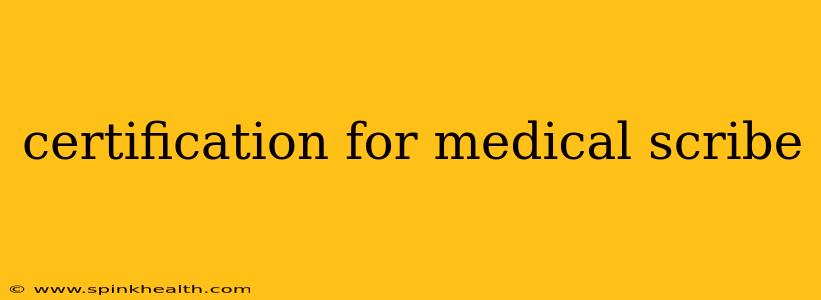The world of healthcare is evolving, and with it, the role of the medical scribe. No longer just note-takers, scribes are now integral members of the healthcare team, assisting physicians with charting, documentation, and even patient communication. But with the growing demand comes a natural question: Is there a certification for medical scribes? The answer, like many things in healthcare, is nuanced. There isn't one universally recognized, mandatory certification, but several reputable organizations offer training and certifications that can significantly boost your career prospects. Let's delve into the specifics.
What are the different types of medical scribe certifications?
The landscape of medical scribe certifications can feel a bit overwhelming. Several organizations offer different levels of training and certification, often tailored to specific niches within the medical field. Some focus on practical skills, while others emphasize the broader aspects of healthcare and medical terminology. This lack of a single, unified standard can be confusing, but also allows you to choose a path that best aligns with your goals and learning style. You'll find programs that range from short, online courses to comprehensive, in-person training programs.
What are the benefits of getting certified as a medical scribe?
The benefits of pursuing a medical scribe certification extend beyond just a piece of paper. A certification demonstrates commitment, competence, and a dedication to professional development. Here are some key advantages:
- Increased Job Opportunities: A certification signals to potential employers that you possess the necessary skills and knowledge, significantly improving your chances of securing a position.
- Higher Earning Potential: Certified medical scribes are often more competitive in the job market, potentially leading to higher salaries.
- Improved Credibility: A certification establishes you as a professional in the field, building trust with physicians and colleagues.
- Enhanced Skill Set: The certification process involves rigorous training, refining your skills in medical terminology, charting techniques, and patient interaction.
- Career Advancement: A solid foundation in medical scribing, often enhanced by certification, can serve as a stepping stone to further healthcare careers.
How much does a medical scribe certification cost?
The cost of medical scribe certification varies greatly depending on the program, the length of the course, and the provider. Expect to find programs ranging from a few hundred dollars for online courses to several thousand for comprehensive, in-person training programs. It's crucial to research thoroughly and compare costs against the potential return on investment. Factor in things like the reputation of the organization, the job placement assistance they offer, and the overall quality of the training.
How long does it take to become a certified medical scribe?
The duration of a medical scribe certification program varies widely, ranging from a few weeks for online courses to several months for more in-depth training. The time commitment also depends on the pace of learning and the intensity of the course. Choose a program that fits your schedule and learning style while ensuring it provides the necessary depth of knowledge.
What skills are needed to become a certified medical scribe?
Becoming a successful medical scribe demands a blend of hard and soft skills. Beyond technical proficiency, you’ll need excellent communication, typing, and critical thinking skills. Many programs emphasize these skills, ensuring graduates are well-rounded and prepared for real-world scenarios.
Is it worth it to get certified as a medical scribe?
The value of medical scribe certification is highly individual. While not mandatory, it significantly enhances your marketability and earning potential in a competitive field. If you are serious about establishing a career in medical scribing, investing in a reputable certification program is likely a worthwhile endeavor. Ultimately, weigh the costs against the long-term benefits to make an informed decision that aligns with your career aspirations. The investment in certification can pay off handsomely in the long run.

